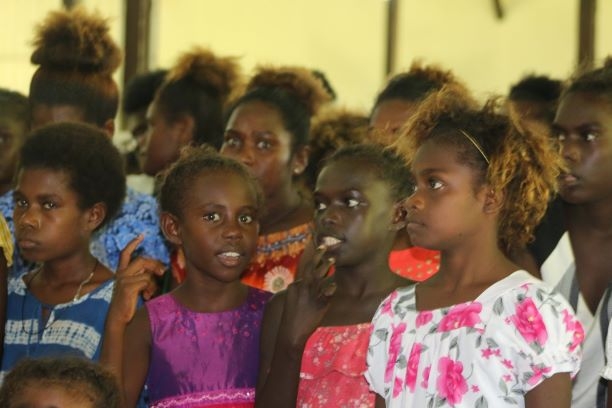By Netani Rika, Buka-: Bougainville
CHURCHES have called for peace, calm and wise choices of leaders in the Bougainville referendum.
With polling stations closed yesterday (Sunday), Bougainvilleans flocked to church in this predominantly Catholic territory and were met with sermons on responsible leadership.
At Hahela, more than 600 people – among them, Autonomous Bougainville Government President, John Momis – gathered at the local Catholic church in thanksgiving for a peaceful vote.
Parish priest, Father Polycarp Kaviak, told the congregation they must vote for leaders who could love, forgive and put others first. “If we say we are Christian, it is important for us to follow the example of Christ’s leadership,” Polycarp said. “World leaders have a throne or a seat of power from which they tell us what to do. Christ’s throne was a cross on which he sacrificed himself for others. Christ showed us that leadership is about sacrifice, about putting others first. We must look for these qualities in the people who want to lead Bougainville.’’
Bougainville’s 206,000 voters began to vote on Saturday to determine whether the region wants independence or greater autonomy while remaining part of Papua New Guinea. Voting ends on 29 November with a result expected in the first week of December.
Once a result is announced, the referendum writ will be returned to PNG Governor-General, Robert Dadae. This will be followed by negotiations between the PNG and Bougainville governments on the way forward to fulfil the will of the people.
Throughout Bougainville, the mood has remained calm during a process which started with a 10-year civil war in 1989 over ownership of the Panguna copper and gold mine. Landowners who felt they had not received equitable royalties from the Australian-owned Bougainville Copper Limited demanded AU$10 billion from the company which was a major revenue earner for PNG.
A war between the Bougainville Revolutionary Army and the PNG Defence Force ended in 1999 and a number of peace agreements, the last in 2001, paved the way for the end of hostilities, return of arms and the referendum. Political observers say the referendum was made possible in a large way by the contribution of women and the churches.
“In fact, the churches allowed the people to have a voice at the height of the conflict when nobody would listen to us,’’ said Martin Miriori, older brother of the late Premier Joseph Kabui. “Through the Pacific Conference of Churches and the late Bishop Patelesio Finau we were able to address the United Nations Commission for Human Rights. The PCC convinced the World Council of Churches to approach the UN and then the world heard our story for the first time.’’
Miriori said the local Catholic church had played an integral role to ensure that peace was maintained once a ceasefire was agreed upon.
“In other places in the world these 20 years of peace we have had would have been impossible,” he said. “Peace could have ended within five years, but the church has played a huge part in keeping the people focussed. We are a peace-loving people.”
Tomorrow (Tuesday) voting moves to the atolls off Bougainville where polling teams arrived today to set up stations. Across the province there will be 72 polling stations in 14 constituencies. Observers from the Commonwealth and the Pacific Island Forum Secretariat have noted a calm but happy electorate with festivities including feasting and dancing in some areas.
There have been no reports of irregularities or violence.
- Netani Rika’s travel to Bougainville was funded by the Pacific Island Forum Secretariat
